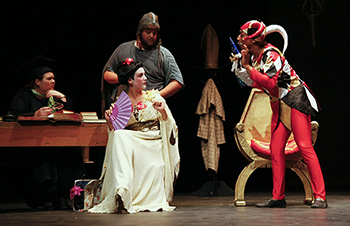Latest News Archive
Please select Category, Year, and then Month to display items
04 April 2024
|
Story Lunga Luthuli
|
Photo SUPPLIED
 Dr Juliet Kamwendo champions gender-inclusive climate action in Africa. Her expertise at the recently held AFR100 workshop highlighted vital steps towards sustainable and equitable development.
Dr Juliet Kamwendo champions gender-inclusive climate action in Africa. Her expertise at the recently held AFR100 workshop highlighted vital steps towards sustainable and equitable development.
Dr Juliet Kamwendo, Lecturer and Programme Director for Gender Studies in the Centre for Gender and Africa Studies at the University of the Free State, is spearheading efforts to integrate gender considerations into Africa's climate restoration agenda. Reflecting on her involvement, Dr Kamwendo stated, "This is particularly crucial, as women make up almost 50% of the population in Africa, and the depletion and degradation of land affect them disproportionately."
She recently served as a gender expert at the AUDA-NEPAD AFR100 workshop in Ouagadougou, Burkina Faso, from 25 to 29 March 2024. This initiative aims to restore forests and degraded land across Africa by 2030, with a focus on gender equality.
The workshop emphasised the integration of gender perspectives into the AFR100 project, acknowledging the disproportionate impact of land degradation on women. Dr Kamwendo's expertise highlighted the need to empower women in climate change interventions, addressing existing gender inequalities exacerbated by environmental degradation.
“Women – who are primarily responsible for household food security and water provision – bear the brunt of environmental degradation, leading to increased workloads, reduced income opportunities, and heightened vulnerability to climate-related disasters. Furthermore, the loss of forest cover and biodiversity further exacerbates the challenges faced by women, particularly in rural areas where they depend heavily on natural resources for their livelihoods,” added Dr Kamwendo.
Her participation highlights academia's crucial role in fostering inclusive and sustainable development, emphasising interdisciplinary collaboration to tackle complex environmental challenges. Through initiatives such as AFR100, stakeholders are working towards a more resilient and gender-responsive future for Africa.
Drama students awarded National Arts Council bursaries
2016-05-04
 |
The National Arts Council (NAC) has awarded R100 000 to 10 Drama students at the University of the Free State (UFS). Eight years after its establishment in 2005, the NAC has partnered our university in funding academically-deserving students needing assistance with tuition. To date, our undergraduate students have benefitted from more than R800 000.
Prof Nico Luwes, Head of the Department of Drama and Theatre Arts, who applies to the NAC at the end of each year on behalf of students, welcomes the funds: “Quite a lot of our students would not have been able to complete their studies without assistance from the bursary scheme.”
As a result of this financial injection, South African schools also gain. “Some students then enrol for a higher education diploma, and they then teach Arts and Culture at schools. Hence, there is a whole new generation of Arts and Culture teachers who are now entering the school system,” said Prof Luwes.
Mbuyiselo Nqodi, a second-year BA Drama and Theatre Arts student, would not have been able to enrol at the university in 2015, had it not been for the NAC. “Without the bursary, I would not have been admitted into the university. It helped a lot because R10 000 can go a long way.”
Pursuing its mandate to support and develop South Africa’s arts, culture and heritage sector, the NAC awarded 117 bursaries to arts students and tertiary institutions for the year. A total of R5 million has been allocated for 2016, a 10% increase on the previous financial year.
According to the NAC Chief Executive Officer, Rosemary Mangope, one of the aims of the NAC is to provide support to students who will contribute to the arts and culture industry in a meaningful and sustainable manner.